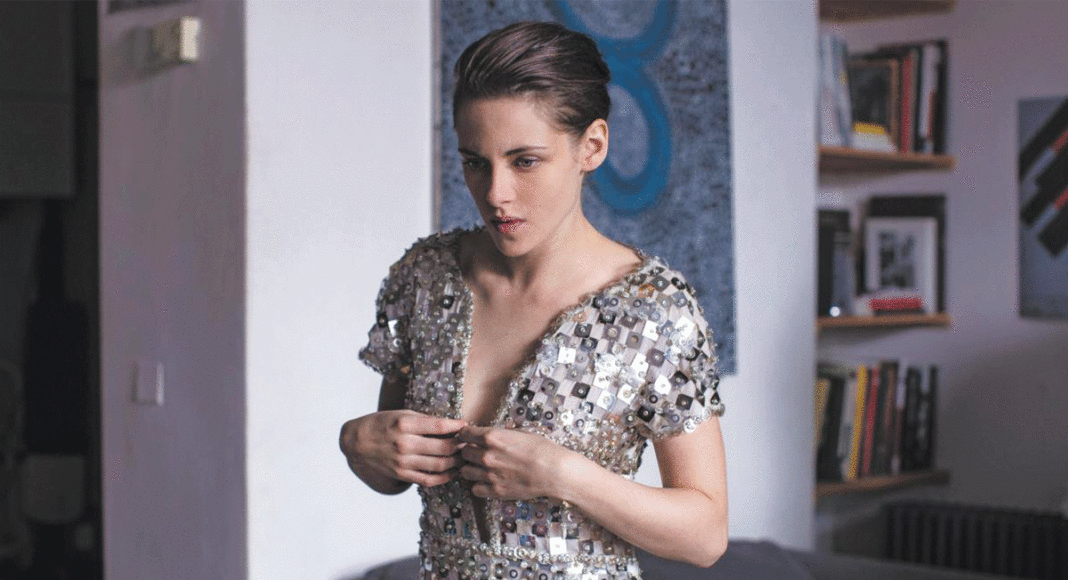The new drama from French filmmaker Olivier Assayas, Personal Shopper, has an identity crisis. It seems to be going in a lot of interesting directions, scrupulously building up elements of mystery, horror, philosophical pondering, character study, and psychological thriller. But like so many modern multi-taskers, in its zeal to be and do everything, it never quite does any one thing well.
Assayas has a reputation for thoughtful, nuanced contemporary stories. His Summer Hours, about three siblings deciding how to disperse their late mother’s art collection, dealt with family and cultural heritage. More recently, his femme-centric Clouds of Sils Maria, involving three women at various stages of life in the theatrical community, explored female issues of aging and image.
The milieu is still upscale in Personal Shopper, although the eponymous protagonist does not exactly belong to that rarefied world. Maureen (Kristen Stewart) is an American adrift in Paris. She works as a personal shopper for a wealthy socialite/philanthropist who is constantly in the papers at charity events and has to look fabulous, but is too busy to shop on her own. It’s Maureen’s job to bomb around Paris on her motorbike, pop into Chanel, Dior, and Cartier to select items, and deliver them to her client.
Maureen is not a fashionista herself, in her grungy sweaters and jeans. She’s also coping with the recent death of her twin brother, Lewis, due to an abnormality of the heart, a condition she also shares. Her friend and sister-in-law, Lara (Sigrid Bouaziz), has moved into an apartment and is selling the house she and Lewis shared in Paris. But Maureen spends a few nights there alone in hopes of making contact with Lewis’ spirit.
As Maureen matter-of-factly tells everyone, she’s a medium, and so was Lewis; they once made a pact that whichever one of them died first would contact the other twin from the other side. She doesn’t do anything overt, like hold a seance; she just wanders around in the dark “waiting”—not only to hear from Lewis, we soon realize, but to figure out a way to escape “a job I hate,” and move on with her life.
There are lots of interesting themes and possibilities here—the colliding worlds of glitz and glam with spirituality, the process of grief, the nature of identity, and the human need for connection in an increasingly alienating world. This last comes to the forefront when the midsection of the movie becomes a kind of stalker melodrama, as Maureen starts receiving a series of insinuating texts. Freaked out at first, she turns to these messages from an unknown texter, and her own responses, as a kind of therapy.
It’s not that these elements never add up (they do, sort of, depending on how you choose to perceive them). The problem is the accumulation of intrigues never quite gains the resonance it should. Whether or not you think you “get” a story, a viewer wants to embrace something about a movie—its cleverness or its profundity or its jazzy style. But this one rarely elicits a strong or satisfying reaction.
Stewart’s angsty face fills just about every frame, but neither she nor the script can make us understand her character’s profound sense of disconnection from life. There are a couple of intensely spooky and eerie paranormal visuals, but also a lot of screen time frittered away in endless shots of Maureen racing through traffic on her bike, or with the camera peering over her shoulder at her tiny phone display screen.
One interesting factoid Assayas tosses into the mix is the story of real-life Swedish artist Hilma af Klint, whose geometric, abstract work at the beginning of the 20th Century anticipated better-known work by artists like Kandinsky by some 20 years. Hilma af Klint claimed spirits were guiding her hand when she painted, so we see snippets of a documentary about her Maureen watches on her phone.
But the artist’s story doesn’t really have anything to do with Maureen’s story. It’s just another potentially interesting ingredient that doesn’t help gel the movie into a meaningful whole.
PERSONAL SHOPPER
**1/2 (out of four)
With Kristen Stewart. Written and directed by Olivier Assayas. An IFC Films release. Rated R. 105 minutes.













